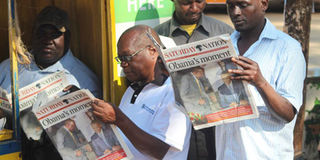Vital lessons to be learned from pastor’s car purchase fraud case

A resident of Kisii reads the Daily Nation on July 24, 2015. The foundation of NMG credibility is the truthfulness of its news. PHOTO | BENSON MOMANYI | NATION MEDIA GROUP
What you need to know:
- Due diligence means researching and verifying the accuracy of the information you get concerning the proposed sale or transaction.
- When making payment, do through the bank. And think twice if you are pressured to pay quickly. To be informed is to be forearmed.
Last Saturday was April Fools’ Day. Kimathi Mwirichia emailed at 6.49 in the morning to complain about Saturday Nation’s page 3 story, ‘Envoys oppose N. Korea missile base in Kenya’.
He wrote: “For anybody with a modicum of education and reads world politics, the piece is profoundly unimaginative and doesn’t qualify to be a Fools’ Day prank. Even a Form Two student would concur with me.”
I would go further and say the story was neither funny nor entertaining.
It was a waste of valuable newspaper space (which later required more space to explain it was a prank).
FRAUD CASE
The foundation of NMG credibility is the truthfulness of its news. In this day of widespread concerns about fake news, a 19th century media tradition should not be allowed to take over the newsroom, even for one day, just for laughs.
But what I really want to talk about is a call that came at 9.17am. Lawyer Karanja Kiari engaged me for 12 minutes.
He was dissatisfied with the way I handled the “Harry Thuku incident” in my column last Friday.
I asked him to put down his thoughts on paper and this is what he said: “I read about Harry Thuku’s incident in which he lost Sh232,000 to fraudsters, who had published an advert in the Nation, purporting to sell a Probox.
"When Mr Thuku called to enquire about the car, they persuaded him to send money urgently via M-Pesa, ostensibly to enable ‘the critically ill vendor to undergo an urgent operation’.
"The man of God was so compassionate that he sent the money before he could meet the seller and without seeing the vehicle.
LESSONS LEARNT
"Whereas the clergyman’s apparent gullibility may raise a few eyebrows, one may argue that people are different and we are shaped by our experiences.
If you have never been conned, you would be inclined to trust strangers, but if you have lost money to evil schemers, you become suspicious of all strangers.
All the same, let us focus on the lessons that we can derive from the incident.
Two words summarise what the clergyman ought to have done: DUE DILIGENCE.
Due diligence means researching and verifying the accuracy of the information you get concerning the proposed sale or transaction.
It includes verifying the identity of the seller, conducting an official search, verifying the genuineness of the document of ownership, et cetera.
DUE DILIGENCE
A good starting point is to consult your trusted friends and family on how to go about the transaction.
Discuss with your lawyer and gather as much information as possible.
Of course, you would have to meet the sellers and see the item being sold before you commit to buy.
When making payment, do through the bank. And think twice if you are pressured to pay quickly. To be informed is to be forearmed.
“[The] media can establish a vetting mechanism for advertisers. Credible advertisers could get an endorsement label such as a green tick.
"This would go a long way in assuring readers that the advertisers’ details can be obtained quickly in case of need.
CREDIBLE ADVERTISER
Secondly, the media should be investigating complaints arising from advertisements, blacklisting rogue advertisers and facilitating justice for the affected parties by passing advertiser’s details to those affected and relevant authorities….The disclaimer ‘Readers are advised to make appropriate enquiries before sending money…’ is not enough.
It is akin to deliberately housing a thief in your house and advising your guests to take care of their belongings.
“Lastly, it is unclear if the public editor’s role extends to verifying allegations brought to his attention. For example, did he verify all the allegations (publication of the advert, money remittance, recurrence of the publication, false telephone numbers entered in the OB by the police)?
It is also unclear whether he represents the public - simply reporting complaints - without consulting the Nation, or he is a neutral Ombudsman listening to both sides before putting forth his recommendations – in which case he ought to have sought the Nation’s response.”
Send your complaints to the [email protected]. Text or call 0721989264





